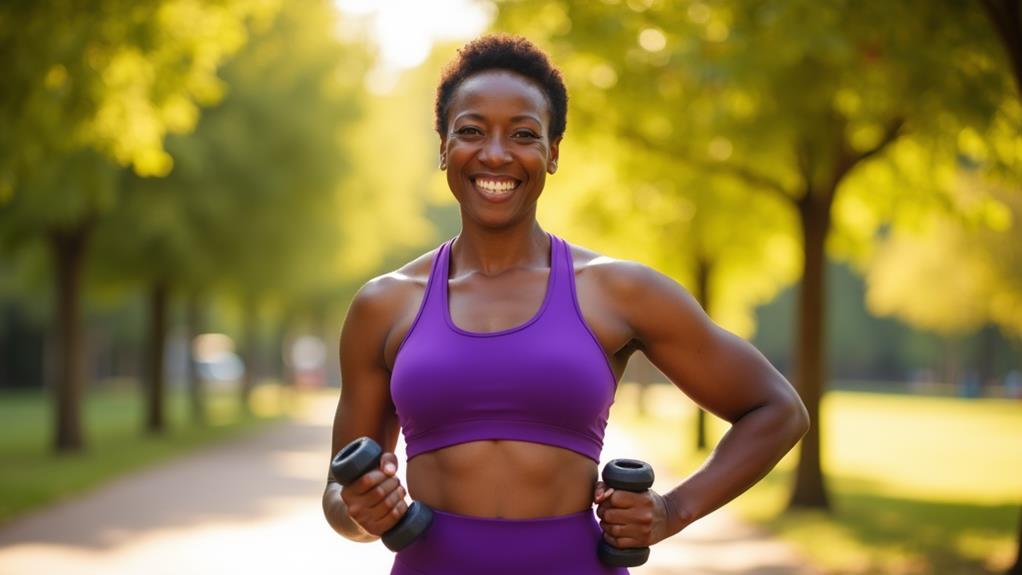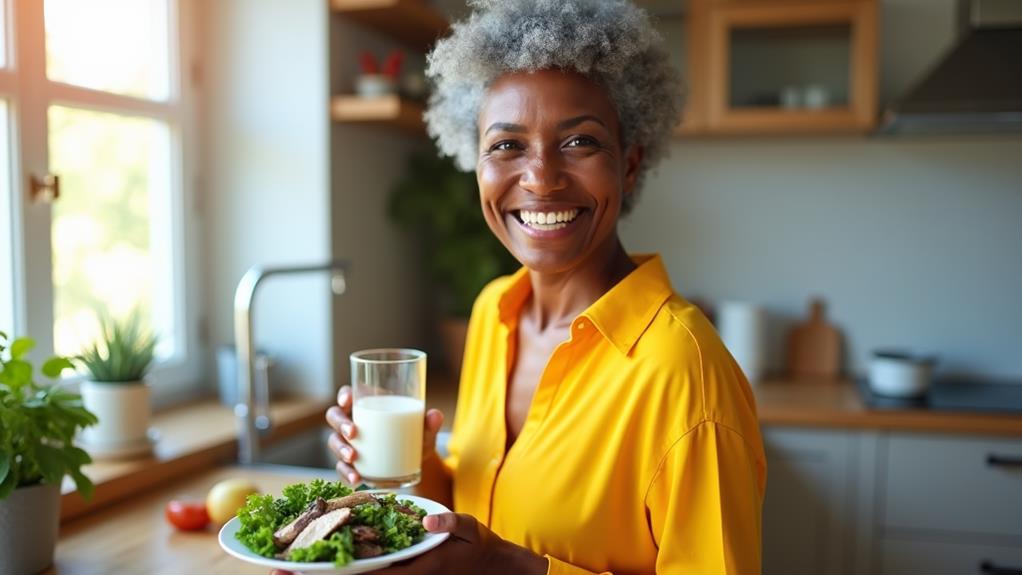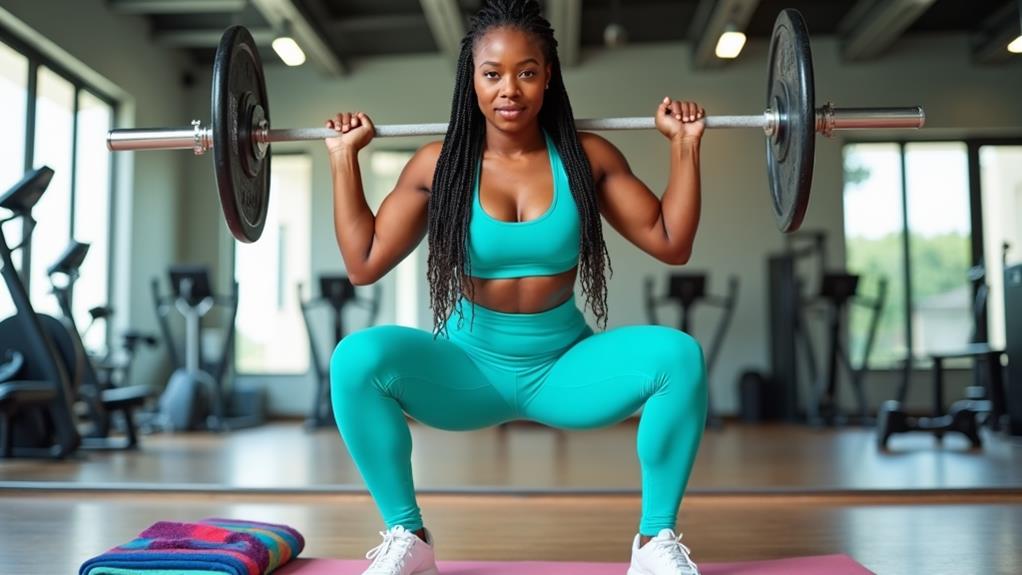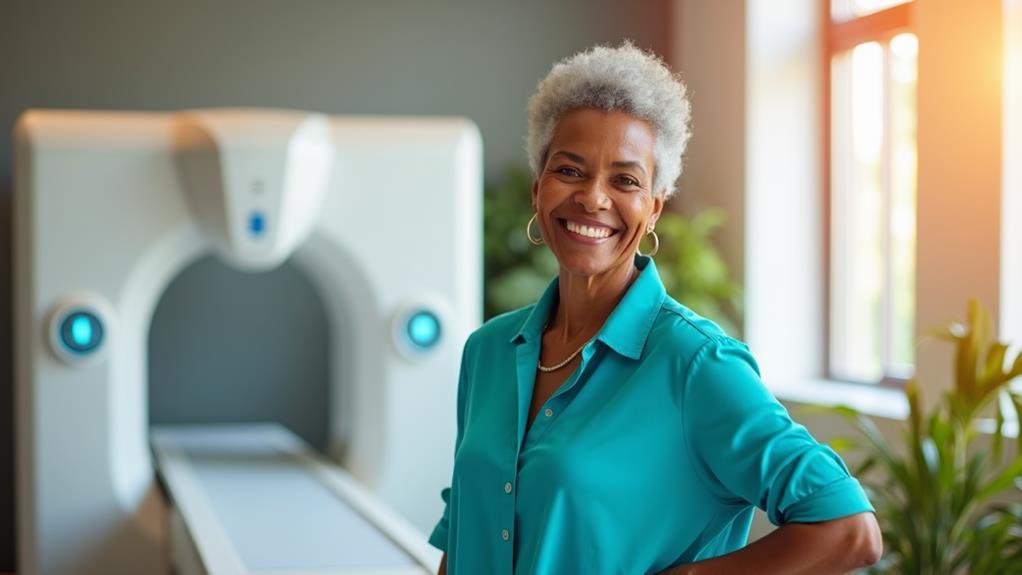Did you know that as a Black woman, your body's higher melanin levels can affect your bone health in unexpected ways? While melanin offers numerous benefits, it can reduce your skin's ability to synthesize vitamin D from sunlight. This unique factor, combined with other genetic and lifestyle influences, means you'll need to approach bone health with tailored strategies. Understanding these specific challenges is just the first step in protecting your skeletal strength. You'll soon discover how to leverage your body's natural advantages and overcome potential hurdles to maintain robust bones throughout your life.
Understanding Unique Risks

Three key factors contribute to unique bone health risks for Black women.
First, you may have a higher bone mineral density (BMD) compared to other racial groups, which can mask early signs of bone loss. This seemingly positive trait can lead to delayed diagnosis and treatment of osteoporosis.
Second, your skin's increased melanin content can reduce vitamin D production. Vitamin D is vital for calcium absorption and bone health. Living in northern latitudes or spending less time outdoors can exacerbate this issue, potentially leading to vitamin D deficiency.
Lastly, you're more likely to be lactose intolerant, which may result in lower calcium intake from dairy products. This can impact your overall calcium levels, essential for maintaining strong bones.
It's important to understand that these factors don't guarantee poor bone health but do increase your risk. Regular bone density screenings, especially after menopause, are vital.
Make sure you're getting enough vitamin D through sunlight exposure, fortified foods, or supplements. If you're lactose intolerant, explore alternative calcium sources like leafy greens, fortified plant-based milk, or calcium supplements.
Vitamin D and Melanin
Melanin, the pigment responsible for darker skin tones, plays an essential role in your body's vitamin D production. As a Black woman, your higher melanin levels offer natural sun protection but also reduce your skin's ability to synthesize vitamin D from sunlight. This can lead to vitamin D deficiency, which is vital for calcium absorption and bone health.
Your body needs adequate vitamin D to maintain strong bones and prevent conditions like osteoporosis. However, you may need up to 10 times more sun exposure than individuals with lighter skin to produce the same amount of vitamin D. This presents a challenge, especially if you live in areas with limited sunlight or spend most of your time indoors.
To address this, consider incorporating vitamin D-rich foods into your diet, such as fatty fish, egg yolks, and fortified dairy products. You may also benefit from vitamin D supplements, but consult your healthcare provider for personalized recommendations.
Regular bone density screenings can help monitor your bone health and detect any issues early on. By understanding the relationship between melanin and vitamin D, you can take proactive steps to protect your bone health.
Debunking Bone Health Myths

Separating fact from fiction is essential when it comes to bone health for Black women.
Let's debunk some common myths that might be holding you back from ideal bone health.
Myth #1: Only older women need to worry about bone health.
Truth: Bone density peaks in your 30s, so it's vital to start building strong bones early.
Myth #2: You can't improve bone density after a certain age.
Truth: While it's harder, you can still strengthen your bones through proper nutrition and exercise at any age.
Myth #3: Dairy is the only good source of calcium.
Truth: Leafy greens, fortified foods, and certain fish are excellent calcium sources.
Myth #4: Osteoporosis isn't a concern for Black women.
Truth: While Black women generally have higher bone density, they're still at risk for osteoporosis and fractures.
Myth #5: High-impact exercise is harmful to bones.
Truth: Weight-bearing and resistance exercises actually help strengthen bones.
Myth #6: You don't need supplements if you eat a balanced diet.
Truth: Many Black women may benefit from vitamin D supplements due to melanin's effect on vitamin D synthesis.
Calcium-Rich Foods for Strength
A well-balanced diet rich in calcium is essential for maintaining strong bones. As a Black woman, you'll want to focus on incorporating calcium-rich foods into your daily meals. Dairy products like milk, yogurt, and cheese are excellent sources, but if you're lactose intolerant, don't worry. There are plenty of non-dairy options available.
Leafy greens such as collard greens, kale, and spinach are packed with calcium and other bone-strengthening nutrients. Sardines and canned salmon with soft bones aren't only calcium-rich but also provide vitamin D, which helps your body absorb calcium more effectively.
For a quick snack, try almonds or Brazil nuts, which are good sources of calcium and healthy fats. Fortified foods can also boost your calcium intake. Look for orange juice, cereals, and plant-based milk alternatives that have added calcium.
Don't forget about less obvious sources like tofu, white beans, and figs. By incorporating a variety of these foods into your diet, you'll be well on your way to supporting your bone health through nutrition.
Weight-Bearing Exercises

Incorporate weight-bearing exercises into your routine to strengthen your bones and reduce the risk of osteoporosis. These exercises force you to work against gravity, stimulating bone formation and increasing bone density. As a Black woman, you may have a lower risk of osteoporosis, but it's still essential to maintain strong bones throughout your life.
Start with low-impact activities like brisk walking, hiking, or using an elliptical machine. These exercises are gentle on your joints while providing bone-strengthening benefits. As you build strength, consider adding higher-impact exercises like jogging, jumping rope, or dancing to your routine.
Resistance training with weights or resistance bands also helps build bone density in specific areas. Aim for at least 30 minutes of weight-bearing exercises most days of the week. If you're new to exercise, start slowly and gradually increase intensity and duration.
Remember to focus on proper form to prevent injuries. Consult your doctor before starting any new exercise program, especially if you have existing health conditions or concerns. By incorporating weight-bearing exercises into your lifestyle, you'll not only improve your bone health but also enhance your overall fitness and well-being.
Lifestyle Factors Affecting Bones
While exercise plays a key role in bone health, several other lifestyle factors can greatly impact your skeletal strength. Your diet, particularly calcium and vitamin D intake, is essential for maintaining strong bones.
Make sure you're consuming calcium-rich foods like leafy greens, dairy products, and fortified foods. Vitamin D, which helps your body absorb calcium, can be obtained through sunlight exposure and certain foods like fatty fish and egg yolks.
Smoking and excessive alcohol consumption can negatively affect your bone density. If you smoke, consider quitting, and limit alcohol intake to promote better bone health.
Stress management is another important factor, as chronic stress can lead to increased cortisol levels, which may contribute to bone loss.
Here are three key lifestyle factors to focus on for ideal bone health:
- Balanced diet rich in calcium and vitamin D
- Avoiding smoking and limiting alcohol consumption
- Managing stress through relaxation techniques and self-care
Screening and Early Detection

Recognizing the importance of early detection, regular bone density screenings are essential for Black women to maintain ideal bone health. These screenings, known as dual-energy X-ray absorptiometry (DXA) scans, measure your bone mass and can identify osteoporosis before a fracture occurs.
You should consider getting your first bone density test around age 65, or earlier if you have risk factors like a family history of osteoporosis or a small frame. Don't wait for symptoms, as bone loss often occurs silently. Your doctor can help determine the right timing for you based on your individual risk profile.
During the screening, you'll lie on a table while a low-dose X-ray scans your hips and spine. It's painless, quick, and non-invasive.
The results, presented as T-scores, compare your bone density to that of a healthy young adult. A score of -1 or above is normal, while lower scores indicate weakening bones.
If your results show low bone density, don't panic. Early detection allows for proactive management through lifestyle changes, medication, or both.
Regular follow-up screenings can track your progress and guide treatment adjustments.
Building Lifelong Bone Health
Building strong bones isn't just about screening; it's a lifelong commitment. As a Black woman, you've got unique factors affecting your bone health, but there's plenty you can do to keep your skeleton strong. Your bones are living tissue, constantly breaking down and rebuilding.
To maintain and improve bone density, focus on a calcium-rich diet, regular weight-bearing exercise, and vitamin D intake.
Here are three key steps to build lifelong bone health:
- Eat calcium-rich foods daily: dairy products, leafy greens, and fortified foods
- Get 30 minutes of weight-bearing exercise most days: walking, jogging, or dancing
- Guarantee adequate vitamin D through sunlight exposure or supplements
Don't forget about other bone-friendly nutrients like vitamin K, magnesium, and potassium.
Limit alcohol intake and avoid smoking, as both can negatively impact bone density. If you're taking medications, check with your doctor about potential effects on bone health.


